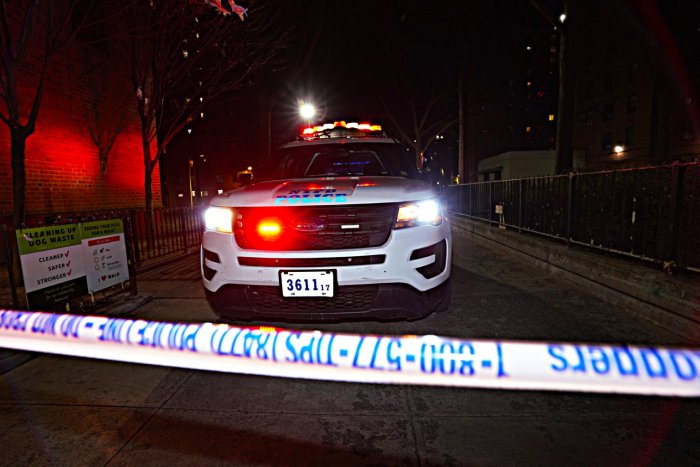
The Department of Health is testing the water at a Rikers Island jail after two inmates in the building were diagnosed with Legionnaires’ disease, according to officials.
One of the two inmates housed at the Eric M. Taylor Center, located at 10-10 Hazen St., remained hospitalized Friday at an undisclosed facility, DOH officials said. The second inmate was treated and released within the last 12 months.
"The health and safety of our officers and the people in our custody is our top priority," Peter Thorne, Department of Correction deputy commissioner of public information, said on Friday. "We are working closely with the Health Department and implementing all safeguards."
Stressing that there is no cause for alarm, DOH deputy commissioner Demetre Daskalakis said the department launches an investigation any time two individuals in the same building anywhere in the city test positive for Legionnaires’ disease within 12 months.
“This is routine for us. We do these (tests) because we really have a sensitive system for identifying individuals with Legionnaires’ who live in the same building,” Daskalakis said. “There is no reason for a heightened sense of alert.”
While the health department takes samples to determine whether Legionella bacteria is present in the building’s hot water system, all of the shower heads have been cleaned and some were modified in order to limit the amount of mist that is produced.
Since Legionnaires’ disease – a type of pneumonia – is contracted through the inhalation of water vapor, residents in a building suspected of Legionella contamination are typically urged to take baths instead of showers. There are no bathtubs at the Eric M. Taylor Center, so DOC engineers worked with DOH staff to come up with a plan for reducing the mist on some of the showers.
“Rikers has posed a different kind of challenge,” Daskalakis said. “They’re coming up with some really smart ideas.”
The inmates were informed of the Legionella testing on Friday via a letter signed by both departments. The modified showers, which produce more of a hose-like stream, are not mandatory for inmates but anyone who is at a higher risk of contracting Legionnaires’ is being encouraged to use them.
Legionnaires’ disease can’t be contracted by drinking contaminated water and is not spread by person-to-person contact, but it can be especially dangerous and potentially deadly to certain individuals, including smokers, people with chronic lung disease or weakened immune systems, anyone with cancer or illnesses like diabetes, kidney failure or liver failure, per the Centers for Disease Control and Prevention. New Yorkers older than 50 are also at a higher risk.
Both of the inmates diagnosed Legionnaires’ have preexisting conditions making them susceptible to the disease, but health officials declined to comment further on their cases and when they occurred, citing patient confidentiality concerns.
Unlike most Legionnaires’ clusters or outbreaks in the city, the possible Legionella contamination at the Eric M. Taylor Center is not related to a cooling tower, according to health officials. Instead, they’re concerned with the building’s hot water system.
It’s unclear exactly how long the Legionnaires’ testing will take, but Daskalakis said the health department has fast-tracked the water sampling process at the jail.
“There are some things we can expedite and there are some things that we’re stuck with because of Mother Nature,” he said. “This could be a several months process or it could be a little bit faster than that.”
The first round of samples has been collected, but DOH needs to wait at least two weeks to see if the bacteria grows.
“If the building ends up being completely Legionella free, then this may be over in a couple of weeks. If there’s anything going on it may take longer,” Daskalakis added. “And every time we do something we have to then resample and after we resample we have another two to three weeks to wait.”
While testing is being conducted, officials are urging inmates who come down with flu-like symptoms to go to the clinic on Rikers Island and get tested for Legionnaires’ disease, which is treatable with antibiotics.
With Lisa L. Colangelo

































